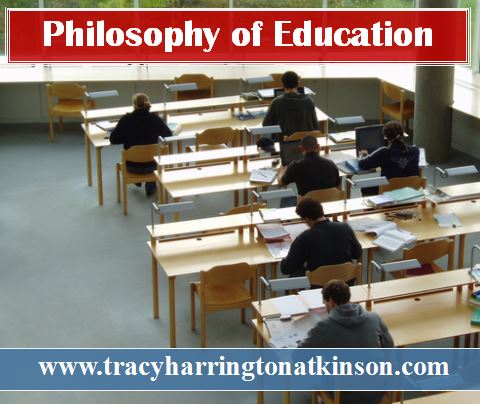 My purpose of education coincides with the educational theories of progressivism and reconstructivism in molding students to be active participants in society as they critically examine their environment in order to contribute to the well-being of society and its members. Students should be encouraged to investigate the instrumental factors which compose the current issues in their communities and the world in order the develop their values as they change and contribute to their surroundings.
My purpose of education coincides with the educational theories of progressivism and reconstructivism in molding students to be active participants in society as they critically examine their environment in order to contribute to the well-being of society and its members. Students should be encouraged to investigate the instrumental factors which compose the current issues in their communities and the world in order the develop their values as they change and contribute to their surroundings.
Students should be encouraged to investigate topics of interest to them within the guidelines and encouragement of their instructors who assume the role of guide, director and mentor. They should have a voice in what they learn as they begin with a foundation from the national and state standards moving into a broader scope that piques their personal inquisitiveness.
Curriculum should be broad with liberties for students to dive to the depth within a topic that interests them. Emphasis should equally reside between behavioral sciences, physical sciences, mathematics and humanities. Students should be encouraged to develop their talents, skills and knowledge through their acquired understanding of the world as it pertains to them.
Having a vanilla educational background, being raised in a middle class socioeconomical status, white, provided me with many opportunities which may not have been available to others. Yet, being female created discrepancies in my schooling as I was consistently directed toward studying the humanities and encouraged to go into teaching. As a high school student when I expressed an interest in law, my counselor swiftly explained the difficulties of pursuing that career path, steering me elsewhere. Following her advice, I enrolled at Purdue University to complete a degree in elementary education.
Dropping out of school temporarily, I served as a missionary in South America, Brazil near the mouth of the Amazon. The poverty of the area overwhelmed my middle class senses as I witnessed families living in cardboard boxes. Children were daily left at the local orphanages as parents opted to give their children a better chance in the world. Such chances rarely included education but these children did receive a daily allotment of food, clothes, bedding and baths. The deprivation inspired me as I returned to the United States two years later and to Purdue University where I diligently studied, learned and applied my knowledge, motivated by a new sense of gratitude and determination to make a difference.
My contrasting experiences from witnessing ‘haves’ and ‘have nots’ altered my perception of education. I moved from a more elitist point of view, believing that educational opportunities needed to be earned to a contrasting opinion, providing opportunities to any and hoping to spark interests in every child. Each individual needs the opportunity to find their individual talents and what they can contribute to society.
Formalizing my philosophy of education and understanding how my background molded my opinions created a consciousness, enabling me to apply myself toward my goals. These beliefs had become so deeply ingrained that I had not enumerated them into a coherent compilation. My religious beliefs, socioeconomical background, culture, ethnicity, experiences from my life and even my sex contributed to this philosophy.

Comments are closed